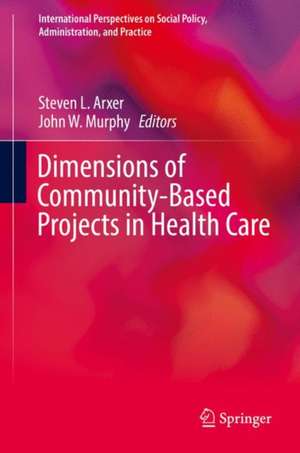Dimensions of Community-Based Projects in Health Care: International Perspectives on Social Policy, Administration, and Practice
Editat de Steven L. Arxer, John W. Murphyen Limba Engleză Hardback – 28 sep 2017
Among the topics covered are:
- Narrative medicine in the context of community-based practice.
- Qualitative and participatory action research.
- Health committees as a community-based strategy.
- Dialogue, world entry, and community-based intervention.
- Politics of knowledge in community-based work.
- Training physicians with communities.
Din seria International Perspectives on Social Policy, Administration, and Practice
- 15%
 Preț: 643.34 lei
Preț: 643.34 lei - 18%
 Preț: 727.18 lei
Preț: 727.18 lei - 5%
 Preț: 367.64 lei
Preț: 367.64 lei -
 Preț: 393.52 lei
Preț: 393.52 lei -
 Preț: 389.11 lei
Preț: 389.11 lei - 18%
 Preț: 895.58 lei
Preț: 895.58 lei - 15%
 Preț: 713.84 lei
Preț: 713.84 lei - 15%
 Preț: 587.02 lei
Preț: 587.02 lei -
 Preț: 390.63 lei
Preț: 390.63 lei -
 Preț: 387.96 lei
Preț: 387.96 lei - 5%
 Preț: 647.49 lei
Preț: 647.49 lei - 5%
 Preț: 708.23 lei
Preț: 708.23 lei - 24%
 Preț: 722.24 lei
Preț: 722.24 lei - 18%
 Preț: 1111.53 lei
Preț: 1111.53 lei - 18%
 Preț: 794.88 lei
Preț: 794.88 lei - 18%
 Preț: 726.55 lei
Preț: 726.55 lei -
 Preț: 386.39 lei
Preț: 386.39 lei -
 Preț: 404.13 lei
Preț: 404.13 lei - 19%
 Preț: 389.36 lei
Preț: 389.36 lei
Preț: 469.74 lei
Preț vechi: 552.64 lei
-15% Nou
Puncte Express: 705
Preț estimativ în valută:
89.90€ • 93.51$ • 74.21£
89.90€ • 93.51$ • 74.21£
Carte tipărită la comandă
Livrare economică 12-26 aprilie
Preluare comenzi: 021 569.72.76
Specificații
ISBN-13: 9783319615561
ISBN-10: 3319615564
Pagini: 207
Ilustrații: XI, 132 p. 4 illus. in color.
Dimensiuni: 155 x 235 mm
Greutate: 0.38 kg
Ediția:1st ed. 2018
Editura: Springer International Publishing
Colecția Springer
Seria International Perspectives on Social Policy, Administration, and Practice
Locul publicării:Cham, Switzerland
ISBN-10: 3319615564
Pagini: 207
Ilustrații: XI, 132 p. 4 illus. in color.
Dimensiuni: 155 x 235 mm
Greutate: 0.38 kg
Ediția:1st ed. 2018
Editura: Springer International Publishing
Colecția Springer
Seria International Perspectives on Social Policy, Administration, and Practice
Locul publicării:Cham, Switzerland
Cuprins
Introduction: holism, ecology, and community-based medicine.- Narrative medicine and public health.- Qualitative research and participatory action research.- Health committees as a community-based strategy.- Dialogue, relevant medicine, and world entry.- Politics of knowledge in community-based work.- Community mapping and population medicine.- Physician training required for community-based projects.- A cultural or a medical model?.- Primary care, primary health care, and community-based interventions.- Conclusions.
Notă biografică
Steven L. Arxer is assistant professor of sociology at the University of North Texas at Dallas. He earned his doctoral degree from the University of Florida. He has published papers in the journals of Humanity & Society and Qualitative Sociology Review and has contributed to several edited volumes, including The Symbolization of Globalization, Development, and Aging (Springer, 2013). His research interests are globalization, NGOs, and gender mainstreaming.
John W. Murphy is professor of sociology at the University of Miami. He received his doctoral degree in 1981 from Ohio State University. His research interests are sociological theory, social philosophy, and globalization. He has published books related to the community mental health movement, the computerization of social service agencies, and contemporary social theory, including The Symbolization of Globalization, Development, and Aging (Springer, 2013).
John W. Murphy is professor of sociology at the University of Miami. He received his doctoral degree in 1981 from Ohio State University. His research interests are sociological theory, social philosophy, and globalization. He has published books related to the community mental health movement, the computerization of social service agencies, and contemporary social theory, including The Symbolization of Globalization, Development, and Aging (Springer, 2013).
Textul de pe ultima copertă
This salient reference grounds readers in the theoretical basis and day-to-day practice of community-based health care programs, and their potential as a transformative force in public health. Centering around concepts of self-determination, empowerment, and inclusiveness, the book details the roles of physicians, research, and residents in the transition to self-directed initiatives and greater community control. Community-focused interventions and methods, starting with genuine dialogue between practitioners and residents, are discussed as keys to understanding local voice and worldview, and recognizing residents as active participants and not simply targets of service delivery. And coverage pays careful attention to training issues, including how clinicians can become involved in community-based care without neglecting individual patient needs.
Among the topics covered are:
Among the topics covered are:
- Narrative medicine in the context of community-based practice.
- Qualitative and participatory action research.
- Health committees as a community-based strategy.
- Dialogue, world entry, and community-based intervention.
- Politics of knowledge in community-based work.
- Training physicians with communities.
Caracteristici
Provides a comprehensive overview of the theretical and practical foundations of community-based health work Draws from various philosophical and sociological traditions of community-based initiatives Includes numerous examples illustrating the importance of a participatory model informed by a community approach
